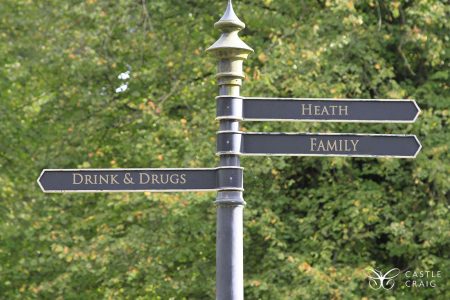Are you struggling with alcohol consumption? Perhaps the reduced alcohol consumption strategy hasn’t worked for you and you’re thinking about giving up alcohol for good. Maybe you’d like to lose weight, improve your mental health or enjoy better sleep. You’re in the right place.
In this article, we’re going to take a look at the specifics of giving up alcohol for one month. We’ll take a look at what withdrawal symptoms you can expect each week and some of the benefits you could enjoy, from deep sleep to losing weight. We’ll also examine how alcohol intake is linked with health issues including weight gain, liver disease, cancer risk, and high blood pressure. We’ll wrap up with some practical steps you can take to get help today.
Worried About Your Drinking? Take the Alcohol Addiction Questionnaire Now
What Happens When You Stop Drinking? A Timeline
If you’re drinking alcohol regularly (particularly binge drinking), you might have tried a reduced alcohol consumption strategy and found yourself surprised by your cravings or physical dependence. If that’s you, you might benefit from giving up alcohol. To quit drinking altogether can sound a bit overwhelming, especially if you’ve suffered withdrawal symptoms in the past. This is where breaking it down into small, manageable chunks can be useful.
When giving up alcohol, it’s not always helpful to think in the long term. It can easily lead to overwhelm which can lead to all sorts of unhelpful thinking patterns, like ‘what’s the point in even trying? Instead, focus on an achievable challenge like giving up alcohol for one month. Interested? Here’s what you can expect…
Week One (7 Days) of Giving up Alcohol
Depending on how physically dependent you are on, you may begin to notice symptoms in as little as a few hours after your last few alcoholic beverages. These could include tremors, sweating, anxiety, and retching.
Over the course of the next day, these withdrawal symptoms will continue to develop and you will likely experience strong cravings for alcoholic beverages, you may also experience a lack of energy and your sleep is very likely to be negatively impacted. Your mental health may also take a bit of a hit here.
Up to around day three, or 72 hours since your last drink, you will experience the most severe withdrawal symptoms, such as high blood pressure and heart rate, along with complications including seizures. However, once you make it to around 72 hours, these symptoms begin to lessen and the process should start to feel a bit more manageable.
From then until the end of your first week, many people find their withdrawal symptoms dramatically lessen or stop altogether. However, for some people who have drunk heavily, these symptoms can continue to worsen and in a few cases can involve unpleasant side effects like confusion.

Find Out About Our Alcohol Addiction Assessment
Week Two (14 Days) of Giving up Alcohol
Between the first and second week is when many clinical detox periods are considered complete. Many people have successfully detoxed the alcohol from their bodies by this point, and the worst of their withdrawal symptoms are over.
One week into stopping alcohol consumption, many people find their sleep quality improves too, although for others this takes several weeks.
After two weeks of giving up alcohol, some people find that they begin to effortlessly lose weight during this time, thanks to removing the excess calories associated with alcoholic beverages. If you don’t lose weight, don’t panic, it’s normal for this to take longer too.
Those that have fatty liver, but haven’t been drinking heavily over a prolonged period of time, may begin to show signs of liver recovery too.
Week Three (21 Days) of Giving up Alcohol
In the third week, if they’ve previously had high blood pressure many people report reduced blood pressure. You might begin to notice a few other positives associated with giving up alcohol, such as better sleep and proper hydration (alcoholic beverages are very dehydrating)
You might also start to realize the heavy costs associated with drinking, not just on your physical health but on your finances, relationships, career, and mental health. Plus you might be simply unwilling to put yourself through the worst of the withdrawal symptoms again.
Week Four (28 Days) of Giving up Alcohol
Getting to this stage is a huge milestone. By the end of the month, your physical withdrawal symptoms should have cleared up and you should be enjoying better mental health. You may be feeling less anxious and depressed and more positive about the future. Most people will also be enjoying better sleep with more deep sleep.
If you have been able to lose weight other people might start to see a difference in you, plus your skin may look fresher and you may be enjoying more energy and feel healthier in yourself. After giving up alcohol for a month, you will likely feel like a very different person.
Long-Term Benefits of Quitting Alcohol
Better Sleep
After quitting alcohol and going through the withdrawal symptoms, many people’s sleep initially gets worse. They may even suffer from insomnia. This is because alcohol acts as a sedative, so if your body has gotten used to it helping you to drift off, it may struggle to either get to sleep in the first place or stay asleep once you are. But don’t worry – stick with it and better sleep is just around the corner!
However, while it might feel like alcohol helps you sleep, you aren’t actually getting high-quality sleep. When you fall asleep after drinking, you will usually fall straight into a deep sleep and skip rapid eye movement (REM) sleep. Ideally, we’d experience around six cycles of REM sleep each night, but if you’ve been drinking you’ll be lucky to get two.
Once your body has gotten through the worst of the withdrawal symptoms and relearns how to sleep without alcohol, you will ultimately enjoy better sleep. And the benefits of getting better sleep with plenty of deep sleep are countless, from getting sick less often to reducing stress levels and improving your mental health. You will wake up genuinely refreshed and consequently, you’ll have more energy, better problem-solving skills, and more control over your emotions and behavior.





Better Metabolism
Cutting out alcohol can boost your metabolism in many ways. When consumed, alcohol is used as the primary source of fuel instead of glucose from carbohydrates or lipids from fats. This means that any excess glucose or lipid will be stored as fat.
Alcohol also puts a lot of strain on your liver, and consuming lots can cause alcoholic fatty liver. This condition affects the way the body metabolizes food and can make it difficult to lose weight. Then there is the simple fact that giving up alcohol means you are removing empty calories (alcohol has calories but very little in the way of nutrients), which can help with weight loss.
Reduced Food Cravings
Giving up alcohol allows you to have more control over what you eat. There are many reasons why alcohol causes you to crave food, and typically calorie-dense food. One study found that intoxicated mice have activated agouti-related peptide (AgRP) neurons, which are responsible for functions including hunger.
Further research found that consuming alcohol also lowers the oxidation of fatty acids, which increases hunger and cravings because fatty acids play a role in appetite regulation.
It’s also well documented in various research and studies that the day after you have been drinking alcoholic beverages, your ghrelin levels (the hormones responsible for signaling hunger) go up and leptin levels (the hormones which help you feel full) go down, meaning you feel hungrier and typically eat more.
Once you consider all of these findings with the fact that alcohol causes reduced self-control, it’s not difficult to understand why drinking causes intense food cravings and results in overeating.
Improved Digestion
Alcohol can cause multiple digestive issues and both occasional and regular drinking can interfere with the stomach’s functions in many ways. In very basic terms, alcohol is an irritant to the gut, and giving up alcohol can help all manner of digestive complaints.
Specifically, research has found alcohol can impact stomach acid production. This is vital, as it helps the stomach to remove unwanted bacteria and help break down food properly. Alcohol can also interfere with your digestive system by damaging your stomach wall. Research* has found that one single heavy episode of drinking can damage the stomach lining that protects the stomach wall, and causes inflammation and even lesions.

Treating Alcohol Addiction Since 1988
Sense of Accomplishment
If you struggle with excess alcohol consumption, making the decision to stop drinking for a month is no small task. Drinking alcohol regularly, especially in excessive amounts as seen with binge drinking, can result in addiction and physical dependence. Choosing to stop all alcohol consumption for a month is a major first step in getting your life back under your control.
While you may have to get through several withdrawal symptoms, the rewards on the other side are countless. You’ll enjoy better sleep with more deep sleep, you might lose weight and see improvements in your mental health. When you quit drinking for a month, you might also see your high blood pressure come down and, if you keep it up, you will lower your cancer risk and risk for liver disease.
You will also enjoy a real and meaningful sense of accomplishment. Setting out to reach a goal – such as giving up alcohol for one month – is admirable, but actually reaching it will give you confidence and a robust belief in yourself.
Giving up alcohol will no longer feel like an impossible challenge to overcome once you’ve got one month under your belt. Not only will you feel fortified by the fact you’ve achieved what you set out to achieve, but you’ll also be encouraged and even spurred on by the benefits you are experiencing, such as losing weight, enjoying deep sleep, and having positive mental health. You might start to come to the conclusion that giving all that up isn’t worth it for the short-lived fun of alcoholic beverages.
Do You Lose Weight When You Cut Alcohol Consumption?
Many people who are interested in reduced alcohol consumption or giving up alcohol altogether are also interested in losing weight. This is because many people who struggle with alcohol consumption also struggle with weight gain. In this section, we’ll take a look at some of the ways that giving up alcohol can help with losing weight.
Losing Weight: Calorie Reduction
When it comes to losing weight, you can’t overlook the role of calories. Simply cutting out alcoholic drinks and doing nothing else should theoretically help you lose weight because although there are little to no nutrients in most alcohol, there are plenty of calories. Approximately, a standard glass of wine has 133 calories, a pint of beer has 239 calories, a bottle of alcopop HAS 172 calories and a double measure of gin has around 95 calories. The fact is: alcoholic drinks are packed with calories.
Those aren’t insignificant numbers, given most people are advised to eat around 2000 – 2,500 calories a day. However, when you consider a binge drinking session, it’s easy to see how some people could end up consuming more than their advised day’s calories in alcohol alone.
Given the impact that alcohol has on food cravings and our overall metabolic function, it makes sense that regularly drinking alcohol – and binge drinking in particular – can lead to weight gain. Although there are various factors at play when it comes to losing weight, making sure you aren’t eating an excessive amount of calories is a good place to start.
Losing Weight: Less Sugar
Excess sugar is not a good idea in many ways. It’s high in calories, so can lead to weight gain, and being overweight can lead to long-term health issues like diabetes and heart disease and increase your cancer risk. Fortunately losing weight can help in some of these areas.
Many alcoholic drinks including wine, beer, cider, and spirits are made from starch and sugar. You can approximately expect to consume 22.5 grams of sugar in a bottle of white wine, 16 grams of sugar in a can of stout, 22 grams of sugar in a can of cider, and 21 grams of sugar in a spirit and mixer.
Considering the government advises no more than 30g of free sugars a day, it wouldn’t take many alcoholic drinks to go over that target. And it looks like many of us are. The charity Drink Aware found that alcoholic drinks account for 11% of the UK population’s daily intake of added sugar. If losing weight is a goal for you, cutting back on the sugar found in alcohol would be a wise move.
Alcohol Support Services
If you are concerned about your alcohol consumption or regularly engaging in binge drinking, there are support services that can help you stop drinking. Giving up alcohol can be challenging, but you don’t have to go through the process on your own. There is help available to help you quit drinking for good, or just take it a month at a time.
Rehab Treatment for Alcohol Addiction
We offer free alcohol addiction assessments as part of our treatment admissions process.
- Drinkchat: online chat service available 9 am – 2 pm week days: www.drinkaware.co.uk/advice/alcohol-support-services/chat-with-an-advisor
- Drinkline: confidential helpline available 9 am – 8 pm weekdays and 11 am – 4 pm weekends: 0300 123 1110
- We Are With You: UK-wide treatment agency: www.wearewithyou.org.uk
- Alcoholics Anonymous: regular recovery meetings and a helpline on 0800 917 7650
Further Advice and Information
If you feel your alcohol consumption is out of your control or you’re regularly binge drinking despite your best efforts, you could benefit from more structured help to stop drinking.
At Castle Craig, we offer an evidence-based treatment program specifically designed to treat alcohol dependence. It has already helped over 10,000 people quit drinking and take back control of their lives.
If the thought of quitting drinking on your own feels too overwhelming, or your withdrawal symptoms are too challenging to manage on your own, residential alcohol rehab with a medically managed alcohol detox could be the best option to help you stop drinking for good.
Whatever you decide, we’re here to chat through any queries. We’re open 24 hours a day, 7 days a week, so call us for a judgment-free, no obligation chat with one of our specialists: 01721 546 263



